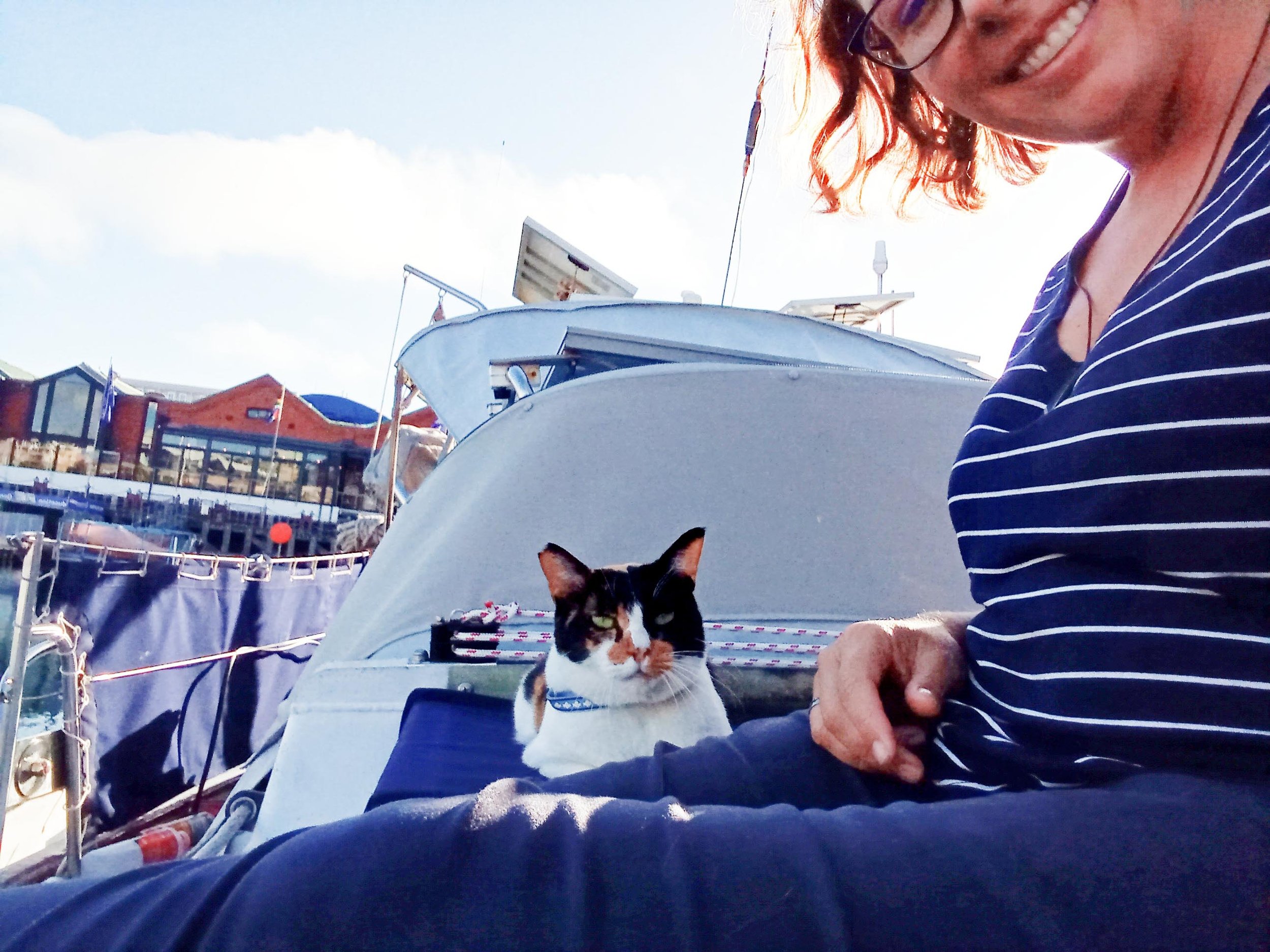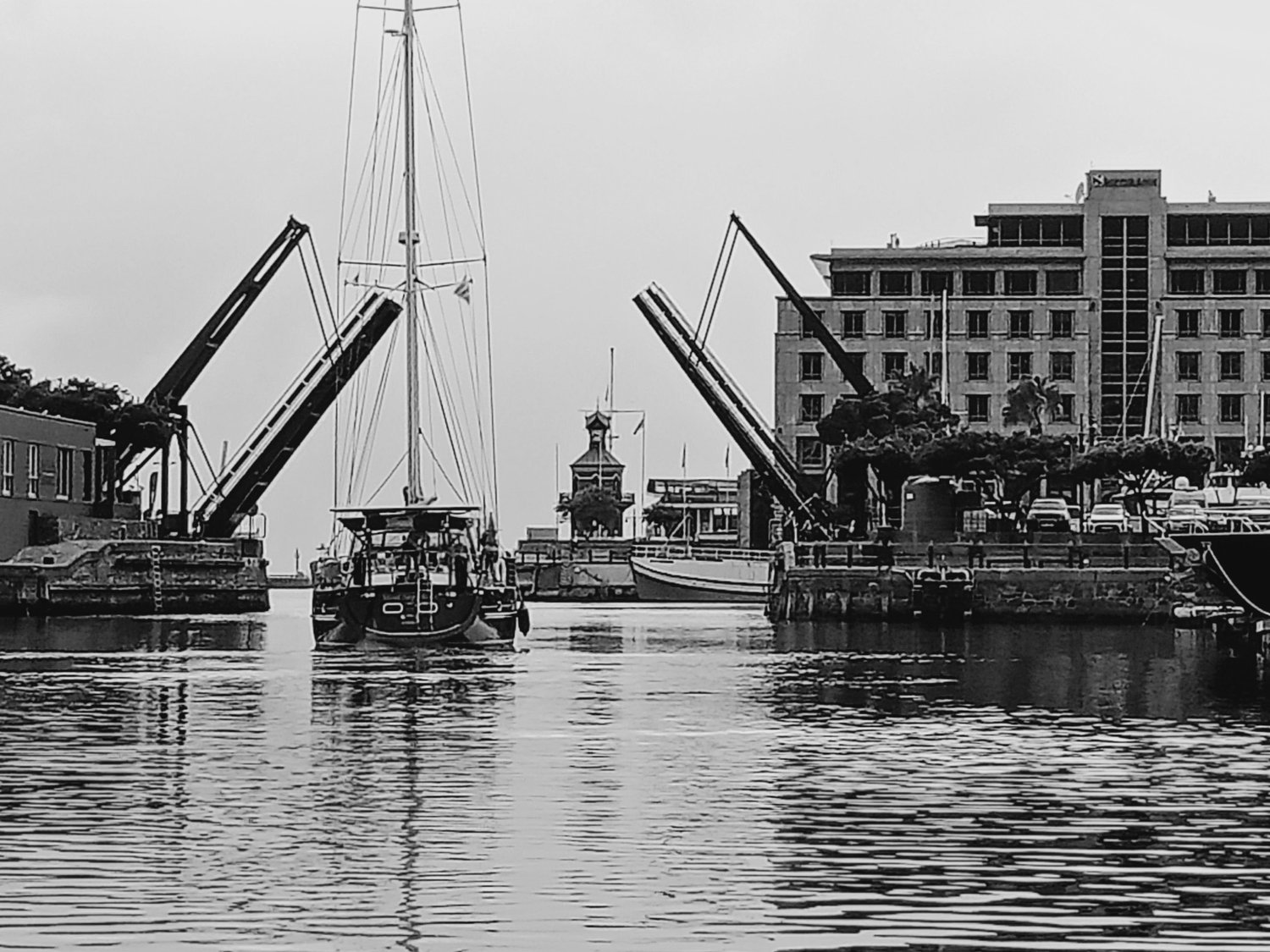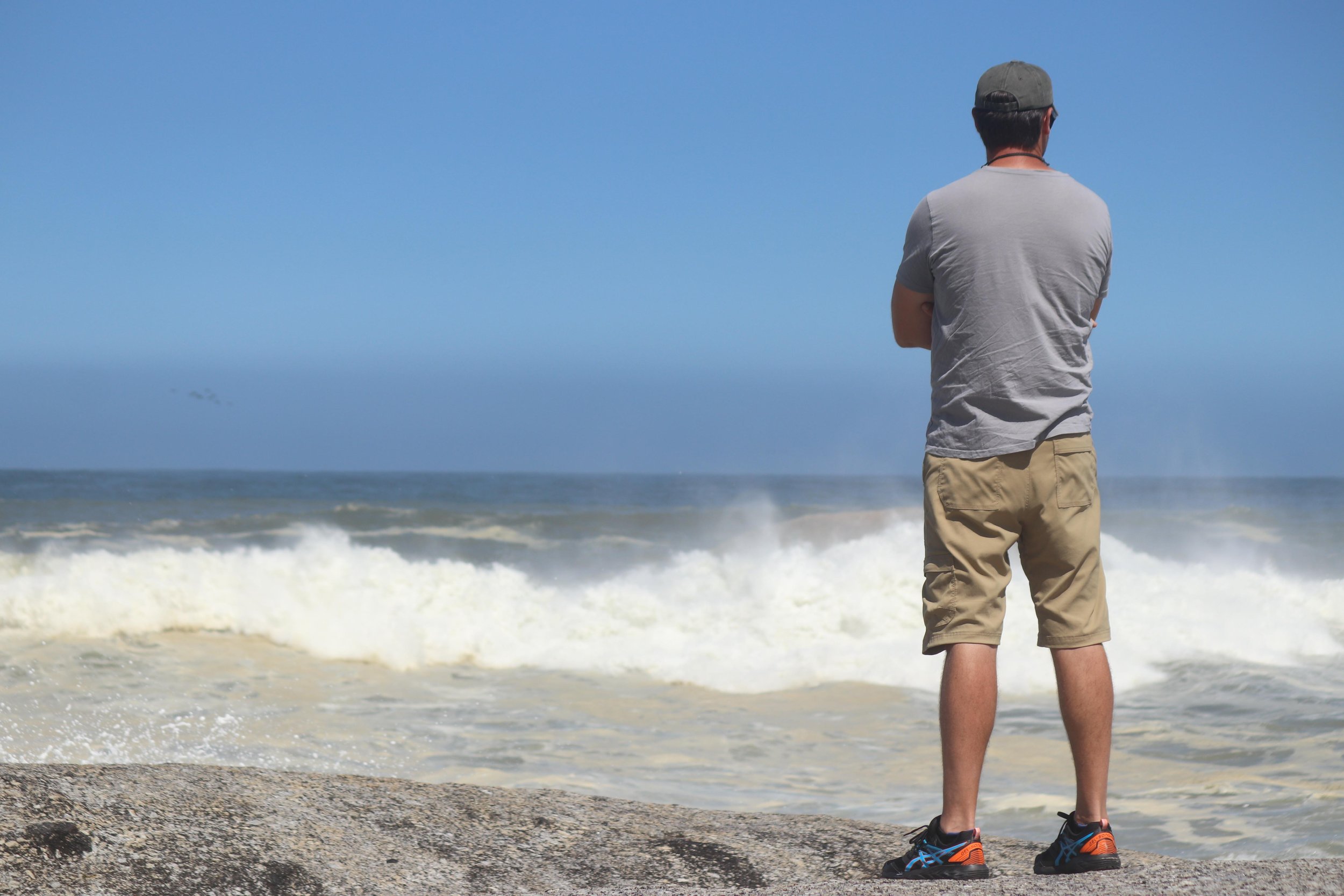Previously feeling a bit confined to the boat out of necessity of defending it from her Frenemy Boots, she finally gets to stretch her legs a bit when Boots departs on his own South Atlantic crossing. Join Kitty as she introduces you to her favorite spot of all in Cape Town.
My Life So Far

When I was attending Bowling Green State University, I kept a sort of journal off and on for the entire time. In fact, for some years after. So far in my life, I’ve stopped doing that. Maybe for the same reason that on my first trip to Paris, I didn’t take a camera. I made a couple of drawings of some of the decor on Notre Dame, though. That butterfly picture is not trying to make a statement, by the way. I just like it. I choose pictures that sort of go with the theme of my post, but that’s as far as it goes.
This is not an in-depth, heart-soothing account of a life of someone who has seen the light. I don’t know if I ever have. I don’t know if I ever want to. I’ve heard that you see the light as you’re dying, and I’m in no hurry. Not that it matters when it’s time, but still. This post is actually about regrets.
It is true, and I’m not the only one to have written the following, that I don’t regret anything I honestly tried to do but failed at, but I do regret things I didn’t try, or didn’t give an honest effort to. Hey, I coulda been a contender, right? For what, I don’t know, but still, hey! If you read this blog, you have no doubt noticed in the past six months or so that most of my posts have been repostings from Odd Godfrey. I’ve been vicariously circumnavigating the planet with them for about six and a half years as of now. I actually met them for the first time at their bon voyage party in San Diego, quite a few moons ago, but I’ve also visited with them every time they’ve been back in Vegas for a short visit. Their boat, named Sonrisa, says “Las Vegas, Nevada” under her name. (They use “her” so don’t talk to me about that issue.) Why this long bit about them? Because, when I was nineteen, I had a chance to try out for a summer job at Cedar Point, Ohio (headquarters of Cedar Fair, the amusement park company.) They had, and probably still do, musical acts preceding some of their shows, such as the first IMAX theater I ever saw.* I chose instead to spend my summer counting parts in an IBM warehouse in Boca Raton, Florida. I had a good summer, but I always wonder what would have happened to my life if I’d gotten a job at Cedar Point as a musician. I love making music, always have. I genuinely regret not giving it a try. Yeah, might’ve flopped, might’ve died by choking on a ham sandwich, maybe lots of stuff, but I should have tried it.
I also wanted to be a writer. My first wife, who to be honest would have been financing the effort, said no way, so I gave up on the idea. Could I have done that anyway, along with a series of jobs for which I was temperamentally unsuited? Maybe. Or at least at the same time as, but I chose to be conventional. Trust me, if you have any creative urges, give up on the idea of being conventional; it’s not worth it, and besides, you don’t really want to be, do you? Well, I write now, but so far nobody’s paying me for what I turn out. That will change, and luckily, my multiple attempts at a normal career (some of which were actually okay) have left me with some pension. Not a huge one, but enough to finance living in France, which I’ll be doing (I don’t say no to adventures anymore.) So, I’m a writer. Also, I have a YouTube channel for my music (nothing uploaded yet) so I’ll be doing a musician bit even though I’m, as my son points out, older than dirt. **
Here I am at 73 years old, starting a new life. Well, why not? I stretch and exercise regularly, so I don’t really suffer a lot of aches and pains. I do crosswords and play other mind games to keep sharp. And, though I’m slow, I still can run, and I’m still about as strong as I ever was. Yeah, that strong. Hulk has nothing to fear from me! Next post I’ll talk about why France, and what I’m planning to do next. (I hope to have some music uploaded shortly.)
Later!
*The first film was about The Grand Canyon, and quite impressive, if devoid of any plot.
**Things were just so nice and clean before dirt!
Isn’t sailing around the world a bit lonely? We get this question sometimes, and in this post we answer it in a round about way. Making and maintaining friendship while cruising is a unique experience. It’s a nod to the inevitable ebb and flow of people physically present in your life. Join us in th
Some of our best sailing friends were preparing to leave Cape Town, but the weather was fierce, the wine plentiful, and the food too darn good for these Oddgodfreys uproot their land based lifestyle just yet. Join us in this post as we experience the Southern Atlantic’s ENORMOUS waves from the safet
But Wait! There’s More!

Those cats are no longer with us. The big one on the bottom tied the world record for cat toes, according to a vet tech. Twenty-seven toes. He looked like several cats glued together, and he had a lovely personality. But, no, that’s not what I’ve been doing.
I have gotten back into playing music. In fact, over the weekend, I performed at a neighborhood party, my first performance of any kind in years. I had a bit of an epiphany while staying in France last Spring, and developed a new and deeper understanding of authenticity. My own especially. I wrote a post about it that you can read over on my writing blog, should you be so inclined. The link is above, to the right. Just click it. Go on, it works. Ahem. Sorry about that. When I was in my teens and twenties, I really wanted to be a folk singer hero. You know, the next Bob Dylan. Of course, Dylan is a heck of a poet, and I’m not, but who’s counting, right? My first song was “Sounds of Silence” from Simon and Garfunkle. Amazingly, my dad’s guitar and my brother’s old record player were both in tune. One string at a time, I plunked it out. Imagine my surprise some years later when, upon checking the sheet music, I discovered that I had it just right! Some people would say it was meant to be. I just say I was lucky. But, I didn’t do much with that talent (I am okay on guitar, no Clapton, but okay) nor with my writing for a few decades. That is a shame, for me. But now, I’m back, folks!
So I practice my music every day. I have a YouTube channel, which shall go nameless for now because there’s nothing on it but a bit of filler, where I will be posting songs as I get good at them, either for the first time, or again. I’ll post when the first videos are up. I also write every day. Not necessarily my current novel project, but stuff, lots of stuff. Blog posts? Yes, even blog posts. And my current project is close to being drafted. (Autocomplete wanted “finished.” A lot autocomplete knows!) This book will sell, because I’m tired of practicing. I’ll post how that’s done as well, either here or on my writing blog, maybe on both. Also, we continue to prepare to move to France. I actually miss France, although it’s difficult to find Fritos ™ there.
There. Two posts, one story. But, also be sure to keep reading the stuff from OddGodfrey. She’s a good writer, and a sailor, and currently in Brazil.
Later!
What Am I Doing?

Last week I told you where I am. Now here is what I’ve been up to. I mean, Blog is short for weB LOG, after all, so here’s a log entry for ya.
I spent three months (almost) in our house in Lizant, France last Spring. Pretty much all Spring, although I was able to enjoy (?) the first of this year’s now famous heat waves. The house retains heat (or cool) pretty well, so with fans, it was okay. Not always great, but okay, so long as I opened all the windows at night and closed them by nine or ten in the morning. There is more I’d like to get done to the place before we move in, from simply painting to overseeing some major remodeling of an old Fish & Chips shop, and a lot of stuff in between. But that will have to wait until the family that has rented it, who are shopping for a house of their own, find and close the deal on said house of their own. It takes about four months to buy a house in France and I don’t think that they have an offer in yet.
This is complicated by the fact that ma bonne mere, mother-in-law, has announced her intention to move back to Phoenix to live with a different daughter this fall. Since her living in our house in Henderson is the reason we couldn’t just up and move to France, well, now we can just up and move to France. Once our house is available, that is. The upside is that they are adding money to our French bank account on a monthly basis. It’s hard to be too upset about that, as our remodeling will probably cost, um rough estimate: a lot!
While I was in France I demonstrated the general rule that breaking any sort of writers’ block may be best accomplished by doing something completely different. I think living in a foreign country (less foreign seeming than it used to be) qualifies. I started a new project, unlike anything I’ve ever done before. I like it. I feel like I must write it, and, amazingly, I don’t really care what the world may think of it. It’s all authentic, all real, and, by cracky, a fantasy. So, I’ve been cranking out a chapter a day (most days) since early June. I’m sure it sucks bigly, which is why I’m looking forward to revising and revising, which probably will start soon. You may see this one for sale yet, folks. As I said, I like it.
And, after years, I’m finally able to do regular runs again. Last week a total of 2.9 blistering miles, with a pace as fast as 12:44. The one-legged man with a bad ankle is having trouble keeping up! And I read, and I watch TV (mostly streamed,) and, well, heck, this is getting long. I’ll post again, maybe even with something funny. ‘Cause I am doing more than I’ve revealed so far. Have a great week, people! Au revoir!
Captain Andrew launches into his Grog-Reprovisioning Project and we ring in the New Year with a cheerful portion of the 2021-2022 South Africa Cruising Fleet. Meet a sailor who truly deserves to have “HOLD FAST” tattooed to his knuckles, and park your own “wagon” to enjoy Make it
Cape Town steeped in maritime history as it is, sailors’ pilgrimages were the order of the day. Before the end of the Oddgodfrey’s first week, we were already feeling 30% more sailor-ly than we did upon arrival.

Well you might ask! I mean, look at this pathetic blog, will you? A few things reposted from somewhere else, lots of blank periods with nothing. What gives? Well, truth is, I have a blog dedicated to writing advice, over at stevefeythewriter (wordpress.com) Between that and the project I’m currently excited to be working on, I kind of run out of writing steam before I get any funny stuff ready for this blog. (Yes, this was originally supposed to be a humorous blog. Don’t think this is funny? No sense of humor!!! Bwaaaa Haaaaaa Haaaaa!
Anyhow, I never have figured out how to get all of my previous posts, when I was using a different hosting service, to work here. Oh, yes, I followed the directions, but, no dice.
Anyhow, that’s why this blog is a bit sparse.
A BIT sparse? Who does he think he’s kidding?
But if you have any interest in writing fiction, check out that blog I link to above. It gets decent reviews from people who subscribe (yes, subscribe, what do you know, huh?) I will make an effort to contribute original material here, too, although honestly, OddGodfrey is a pretty entertaining blog!
With the whole fleet’s lines secured to their dock slip of choice, holiday festivities of 2021 were under way. Just like celebrating on land, we enjoy the antics of Crazy-Uncle-Pete, a series of culinary successes, and the kind of epic Christmas Dessert failure that places 2021 in the “Most Mem





